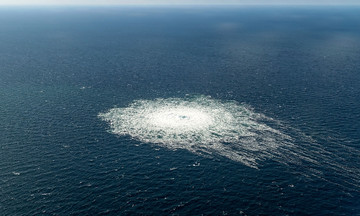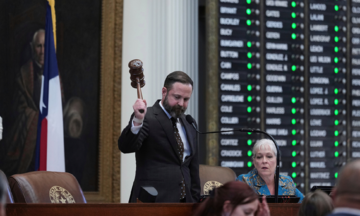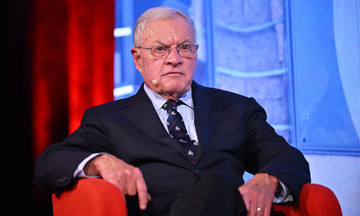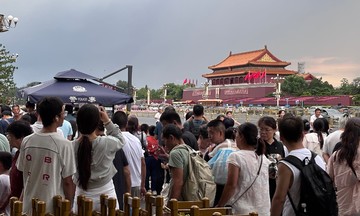After repeatedly sidestepping the issue, former US President Donald Trump acknowledged on 28/7 that Gaza is facing a famine. "It's a real famine, I've seen it and you can't fake it. We have to feed the children," he told reporters in Scotland during a 75-minute question-and-answer session with British Prime Minister Keir Starmer.
When Trump arrived in Scotland for a five-day trip, his primary concern regarding Gaza seemed to be that he had not received enough thanks for US aid, and that other countries should do more to help the starving children there.
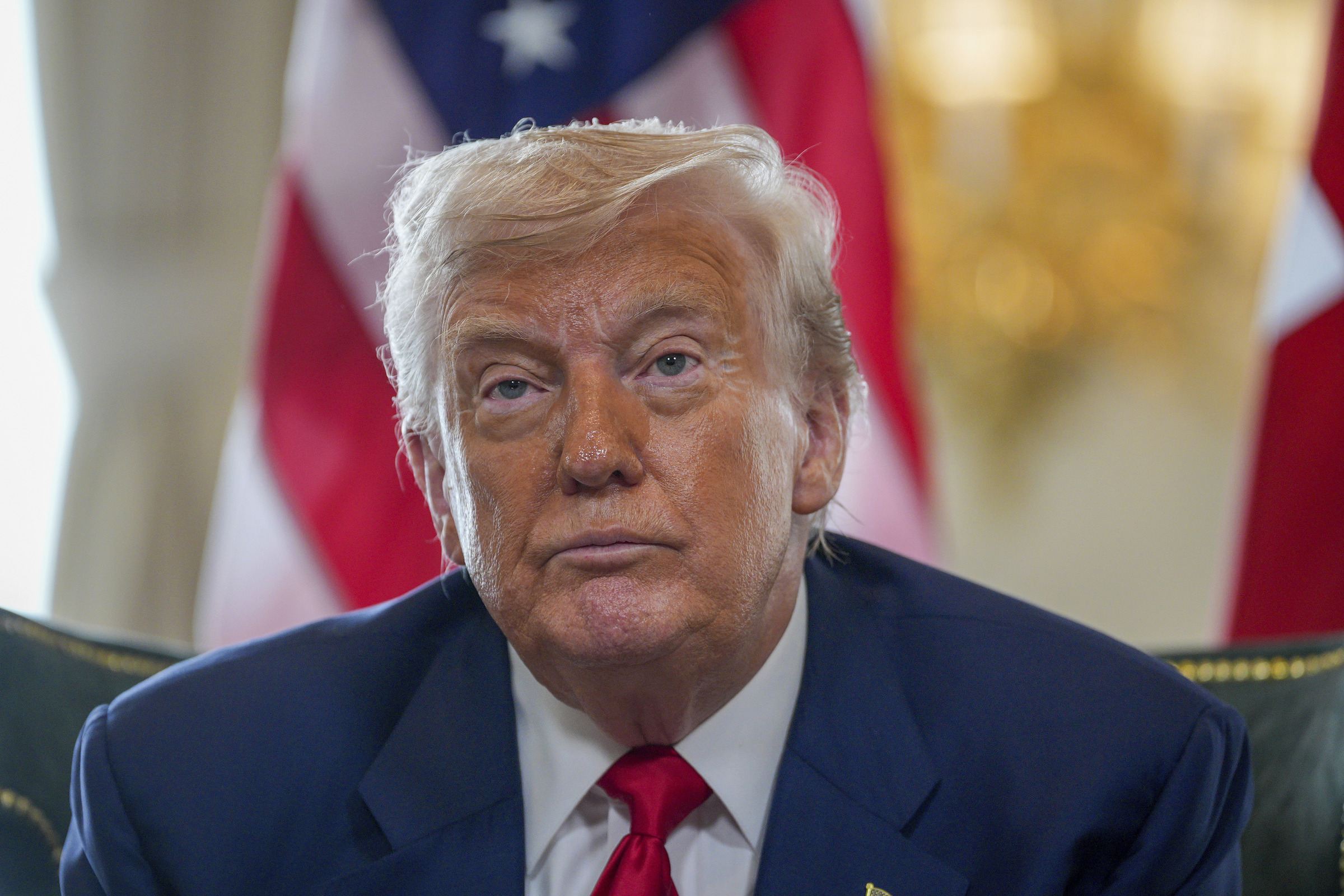 |
Former US President Donald Trump speaks to the media while meeting with British Prime Minister Keir Starmer at the Trump Turnberry golf club in Turnberry, Scotland, on 28/7. Photo: AP |
Former US President Donald Trump speaks to the media while meeting with British Prime Minister Keir Starmer at the Trump Turnberry golf club in Turnberry, Scotland, on 28/7. Photo: AP
"Nobody said 'thank you very much'," Trump complained on 27/7. "It would be nice to get at least a thank you."
The former president’s shift comes as world leaders and humanitarian organizations warn that over 20 months of conflict and Israeli aid restrictions have left Gaza facing a food security crisis.
"We're giving money and other things," he said, adding that he would ask Israeli Prime Minister Benjamin Netanyahu to ensure aid reaches those in need. "I want to make sure they get food, every bit of it."
Global crises, especially those far from US shores, often test American presidents' international leadership. Failures to address such crises often lead to deep regrets. During a 1998 visit to Rwanda, President Bill Clinton admitted that the US and the rest of the world had not done enough to prevent the genocide there. Upon leaving office, President Barack Obama reflected on why his administration had not better prepared for the social unrest that engulfed Libya after the ouster of leader Muammar Gaddafi.
For Trump, who prides himself on his handling of international deals, the famine in Gaza is a test of whether his "America First" foreign policy can address one of the 21st century's greatest humanitarian disasters, observers say.
The United Nations, experts, and doctors have warned for months about the risk of famine in Gaza since Israel blocked aid supplies, citing concerns about Hamas accessing them.
The famine has now spread throughout Gaza. According to data released by Gaza health authorities on 26/7, at least 56 people died of starvation in the past month, accounting for nearly 50% of all starvation deaths since fighting erupted nearly two years ago.
Despite this, Trump seemed hesitant to use US power to ensure food, medicine, and fuel reach the approximately two million Gazans living in extreme poverty.
Three weeks prior, when Trump met Netanyahu at the White House, he did not delve into what international humanitarian organizations describe as a "full-blown food crisis in Gaza". The two leaders praised each other and blamed Hamas for refusing to agree to a ceasefire.
When French President Emmanuel Macron announced last week that concerns about the impending famine in Gaza led him to recognize a Palestinian state, Trump expressed no similar concern. Instead, he focused on the recognition issue. "What Macron says is not important," Trump said. "That statement carries no weight".
Upon arriving in Scotland on 25/7, Trump evaded questions about the Gaza famine by asserting that the US and Israel provided food to people there, but Hamas blocked it.
Meeting with European Commission President Ursula von der Leyen on 27/7, Trump declared that the dire situation in Gaza "is not an American problem, it's an international problem".
Just days earlier, the Trump administration said it had approved $30 million to fund a new aid distribution system in Gaza backed by Israel and run by US contractors. Shootings and violence at such food distribution points, which have claimed dozens of lives, have raised international concern.
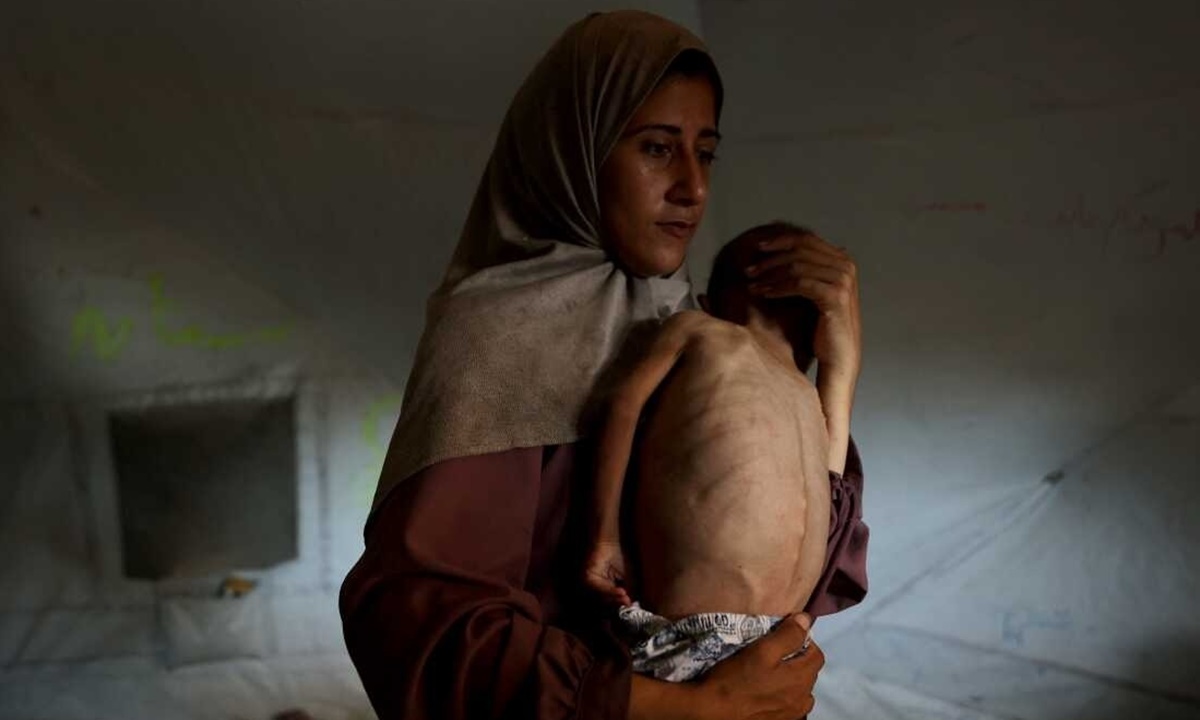 |
A mother in Gaza holds her 18-month-old son, who is sick and showing signs of malnutrition, at the Al-Shati refugee camp, west of Gaza City, on 24/7. Photo: AFP |
A mother in Gaza holds her 18-month-old son, who is sick and showing signs of malnutrition, at the Al-Shati refugee camp, west of Gaza City, on 24/7. Photo: AFP
But when meeting Trump in Scotland, British Prime Minister Starmer took the opportunity to mention the "horror" of witnessing the suffering of Gazans. Starmer said he discussed the "humanitarian crisis", including images of the famine in Gaza, with Trump.
This seemed to sway Trump. He left the meeting criticizing the current US-backed aid distribution effort as ineffective. He said he wanted to create more accessible food distribution points for Gazans.
"We will set up food centers where people can come without any barriers," he said, adding that Britain would support the US in this effort. Trump described the current situation as "they see the food there, but no one can get to it because of the barriers erected".
In another notable shift, Trump on 28/7 also expressed disagreement with Israeli officials for denying the Gaza famine. He said he "especially" disagreed with Netanyahu's recent statement that there is no famine in Gaza.
Experts believe Trump's change stems partly from his own MAGA base, which has become increasingly critical of Israel as the Gaza conflict nears its second year.
MAGA's support for Gazans became even clearer last weekend with some right-wing voices adding weight to long-standing calls for aid from the left.
"I can say for sure that what happened to the innocent people in Israel on 7/10 last year was truly horrifying. Just as I can say for sure that what is happening to the innocent people and children in Gaza is terrible. This conflict and humanitarian crisis must end!" Republican Representative Marjorie Taylor Greene, a close Trump ally, wrote on X on 27/7.
Popular podcast host Theo Von, who supported Trump's 2024 campaign, urged the former president and bipartisan leaders to "get aid into Gaza immediately".
"Children are starving!!" Von wrote on X. "This is not a political issue. This is a humanitarian issue."
Basim El-Arra, executive director of the Muslim civil rights and advocacy group CAIR Action, said recent images of malnourished children in Gaza, barely alive and emaciated, have sparked international outrage, putting pressure on Trump.
"Some people thought the President would stop the crisis as he promised during his campaign, but nothing has changed," El-Arra said. "We still believe Trump is the only one who can really stop this tragedy. Just one phone call to Prime Minister Netanyahu saying: 'Enough. Stop. Ceasefire. Let the aid into Gaza'."
Vu Hoang (According to AP, AFP, NBC News)



